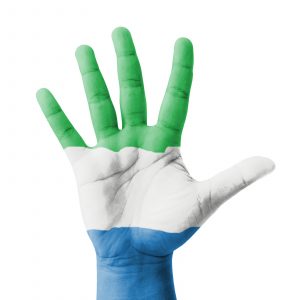The hype around so called applications of “blockchain technology” is nothing new, as many people have successfully used it to get free publicity for themselves, riding the coattails of Bitcoin’s success. But while it so far was limited mainly to promoting ICO tokens and inflating stock prices, now it seems to have crossed a border into political affairs. Today the people behind the election process in the African nation of Sierra Leone had to publicly come out to correct the record about “the world’s first blockchain elections.”
Also Read: European Brokerage Robomarkets Adds Cryptocurrency CFDs for 24/7 Trading
C++ and SQL, No Blockchain

Mohamed Conteh the Chairman of the National Electoral Commission (NEC) of Sierra Leone, the constitutionally-mandated organization supervising voter registration and all public election in the country, has come out to make it clear for the public that despite multiple media reports to the contrary, no distributed ledger technology was used during the country’s 7 March national elections. He stated that “the NEC has not used, and is not using blockchain technology in any part of the electoral process.”
Following the chairman’s statement, the commission even publicly revealed its exact technology used in the process to clear up any misconception. “The National Electoral Commission uses an in-house database to tally election results. This database was originally developed for the elections held in 2012. It was then expanded and updated, prior to the 2018 elections. The database was developed in C++ and runs on MS SQL – neither of which are open source applications. And it does not use Blockchain in any way.”
World’s First Blockchain Elections Hype
 The false narrative that the NEC is trying to counter is that the country, which is struggling with having a fair, free and peaceful elections as it is still recovering from years of civil war, has been the testing ground for some kind of groundbreaking foreign technology. The source of this confusion is a Swiss startup which was an international observer during the process and published its own results as if it was working with the NEC, which many publications around the world ran with without questioning any of the claims.
The false narrative that the NEC is trying to counter is that the country, which is struggling with having a fair, free and peaceful elections as it is still recovering from years of civil war, has been the testing ground for some kind of groundbreaking foreign technology. The source of this confusion is a Swiss startup which was an international observer during the process and published its own results as if it was working with the NEC, which many publications around the world ran with without questioning any of the claims.
Local Freetown entrepreneur Morris Marah told RFI: “It would be like me showing up to the UK election with my computer and saying, ‘let me enter your counting room, let me plug-in and count your results,’ they basically took a paper card of the results and put it on their system. That’s what everybody else is doing, that’s not new.”
Tamba Lamin, technical architect for the Sierra Leone Open Election Data Platform, stated: “[we] are deeply concerned about the misleading headlines being propagated on the internet…Agora is claiming undue credit for doing nothing that helped the people of Sierra Leone…we find this unethical and insulting to the people of this country. The results tallied and published by Agora had no impact on the 2018 Elections. All we ask for is that the company does the right thing and retract the fake news otherwise we will be forced to take any recourse available to us.”
Should crypto news sites just stick to reporting on real currencies like bitcoin and leave the blockchain technology hype for companies to dupe investors with? Share your thoughts in the comments section below!
Images courtesy of Shutterstock.
Do you like to research and read about Bitcoin technology? Check out Bitcoin.com’s Wiki page for an in-depth look at Bitcoin’s innovative technology and interesting history.
The post Mainstream Media Reports of “Blockchain Elections” in Sierra Leone Are All Fake News appeared first on Bitcoin News.

Bitcoin.com is author of this content, TheBitcoinNews.com is is not responsible for the content of external sites.
Our Social Networks: Facebook Instagram Pinterest Reddit Telegram Twitter Youtube










